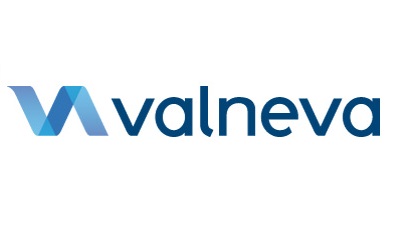- VLA2001 successfully met both co-primary endpoints
- Superior neutralizing antibody titer levels compared to active comparator vaccine, AstraZeneca’s AZD1222 (ChAdOx1-S)
- Neutralizing antibody seroconversion rate above 95%
- VLA2001 induced broad T-cell responses with antigen-specific IFN-gamma-producing T-cells against the S, M and N proteins.
- VLA2001 was well tolerated, demonstrating a statistically significant better tolerability profile compared to active comparator vaccine
 Valneva, a specialty vaccine company, today announced positive topline results from the Phase 3 pivotal trial Cov-Compare of its inactivated, adjuvanted COVID-19 vaccine candidate, VLA2001. Valneva’s Chief Executive Officer, Thomas Lingelbach, and the trial’s Chief Investigator, Adam Finn, Professor of Paediatrics at the University of Bristol, will comment on the results in a live webcast beginning at 3 p.m. CET today.
Valneva, a specialty vaccine company, today announced positive topline results from the Phase 3 pivotal trial Cov-Compare of its inactivated, adjuvanted COVID-19 vaccine candidate, VLA2001. Valneva’s Chief Executive Officer, Thomas Lingelbach, and the trial’s Chief Investigator, Adam Finn, Professor of Paediatrics at the University of Bristol, will comment on the results in a live webcast beginning at 3 p.m. CET today.
The pivotal Phase 3, Cov-Compare trial recruited a total of 4,012 participants aged 18 years and older across 26 trial sites in the United Kingdom. The trial met its co-primary endpoints: VLA2001 demonstrated superiority against AZD1222 (ChAdOx1-S), in terms of geometric mean titer for neutralization antibodies (GMT ratio=1.39, p<0.0001), (VLA2001 GMT 803.5 (95% CI: 748.48, 862.59)), (AZD1222(ChAdOx1-S) GMT 576.6 (95% CI 543.6, 611.7)), as well as non-inferiority in terms of seroconversion rates (SCR above 95% in both treatment groups) at two weeks after the second vaccination (i.e. Day 43) in adults aged 30 years and older.
T-cell responses analyzed in a sub-set of participants showed that VLA2001 induced broad antigen-specific IFN-gamma producing T-cells reactive against the S- (74.3%), N- (45.9%) and M- (20.3%) protein.
VLA2001 was generally well tolerated. The tolerability profile of VLA2001 was significantly more favorable compared to the active comparator vaccine. Participants 30 years and older reported significantly fewer solicited adverse events up to seven days after vaccination, both with regards to injection site reactions (73.2% VLA2001 vs. 91.1% AZD1222 (ChAdOx1-S), p<0.0001) and systemic reactions (70.2% VLA2001 vs. 91.1% AZD1222 (ChAdOx1-S), p<0.0001). No unsolicited treatment-related serious adverse events (SAE) have been reported. Less than 1% reported an adverse event of special interest in both treatment groups. Participants in the younger age group vaccinated with VLA2001 showed an overall safety profile comparable to the older age group.
The occurrence of COVID-19 cases (exploratory endpoint) was similar between treatment groups. The complete absence of any severe COVID-19 cases may suggest that both vaccines used in the study prevented severe COVID-19 caused by the circulating variant(s) (predominantly Delta).
Adam Finn, Professor of Paediatrics, University of Bristol, Trial Chief Investigator, said: “The low levels of reactogenicity and high functional antibody responses alongside broad T-cell responses seen with this adjuvanted inactivated whole virus vaccine are both impressive and extremely encouraging. This is a much more traditional approach to vaccine manufacture than the vaccines so far deployed in the UK, Europe and North America and these results suggest this vaccine candidate is on track to play an important role in overcoming the pandemic.”
Thomas Lingelbach, Chief Executive Officer of Valneva, said: “These results confirm the advantages often associated with inactivated whole virus vaccines. We are committed to bringing our differentiated vaccine candidate to licensure as quickly as possible and continue to believe that we will be able to make an important contribution to the global fight against the COVID-19 pandemic. We are keen to propose an alternative vaccine solution for people who have not yet been vaccinated.”
Juan Carlos Jaramillo, M.D., Chief Medical Officer of Valneva, commented: “I would like to thank the trial investigators as well as all trial participants and collaborators, especially the National Institute for Health Research and the clinical teams within the NHS Research Centres as well as Public Health England. This outcome shows the value of the collaboration that we started in September 2020 and we could not have achieved this milestone without them. We’ll continue to work very closely with the MHRA to complete our rolling submission for approval.”
Valneva commenced rolling submission for initial approval with the UK’s Medicines and Healthcare products Regulatory Agency (MHRA) and is preparing to commence rolling submission for conditional approval with the European Medicines Agency. A final assay validation required by the MHRA to verify the integrity of the VLA2001-301 data remains ongoing and is a prerequisite for final submission of the clinical study report.
As part of the product development strategy, Valneva has completed recruitment of 306 volunteers aged 56 years and older in New Zealand into its VLA2001-304 trial and expects topline data in early 2022. Valneva has also announced the start of recruitment of adolescents as an expansion of the Cov-Compare trial.
The Company is preparing for trials in children (5-12 years of age) and a Valneva sponsored booster trial to evaluate VLA2001’s booster performance for people in need of a booster.
